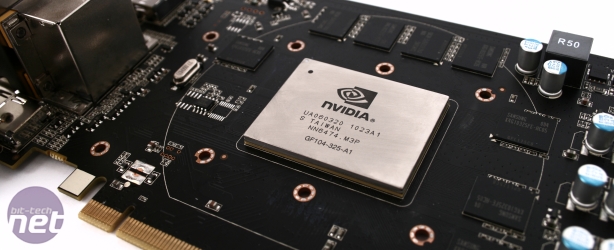
Overclocking Nvidia’s GeForce GTX 460 768MB and 1GB
Nvidia’s recently launched GeForce GTX 460 range are the company's most competitive graphics card in years. Available in both 768MB and 1GB versions, these cards are both fast and good value – they’re ideal for anyone looking to buy a graphics card for less than £200. Not only has Nvidia been able to stop the mocking of Fermi, but the GTX 460 has also outperformed the competition, leading to speculation on ATI price drops. For enthusiasts, the release of the GTX 460 is good news all around.Even though both models are easily fast enough to keep up (or outpace) their Radeon rivals, we were interested to see how overclocking would increase their performance.

The GeForce GTX 460 performs well at stock-speeds, but what will happen when we overclock it by 30 per cent? Click to enlarge
How we tested
We used two overclocking tools with the GTX 460: MSI’s Afterburner gave us simple control over the GPU’s clock speeds, while GPU-Z verifies that our overclock has been applied properly. We also used GPU-Z to monitor fan speeds and temperatures to give us some objective results as to whether we’ve found an overclock that we can live with every day or whether all we’ve achieved is a maximum stable overclock.We also tested for stability using Crysis 1.21, which will help us pinpoint problems with our overclock, as Crysis stresses both the GPU and memory, and typically reacts well to graphics card overclocks. Memory instabilities usually manifest themselves (with the GTX 460, at least) as red and green spots which occasionally flash on the screen, whilst GPU-based problems usually cause a game crash. Because of this, we were able to easily determine whether it was the memory of the GPU that caused the problem, and thus be able to tune our overclock.
Finally, bear in mind that while we're trying to achieve a maximum stable overclock for both the GTX 460 768MB and the GTX 460 1GB, we’re not necessarily recommending that these overclocks should be applied for everyday use.
The specifications of our test system are as follows:
Intel Core i7 Test System
- Intel Core i7-965 processor (3.2GHz: 133MHz x 24)
- Asus P6T V2 motherboard (Intel X58)
- 6GB of Corsair 1,600MHz XMS3 DDR3 memory (triple-channel, 9-9-9-24-1T timings)
- Corsair X128 120GB SSD
- Corsair HX1000W PSU
- Windows 7 Home Premium x64
- Antec Twelve Hundred Chassis
We used the EVGA GeForce GTX 460 768MB as this card is based on the reference design for the GTX 460 768MB, and the Zotac GeForce GTX 460 1GB as this card is as close to the reference design as we could source. The cooler on the Zotac card is not the standard Nvidia cooler.
GeForce GTX 460 768MB Overclocking
GeForce GTX 460 1GB Overclocking

MSI MPG Velox 100R Chassis Review
October 14 2021 | 15:04








Want to comment? Please log in.